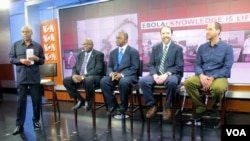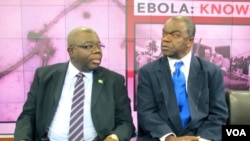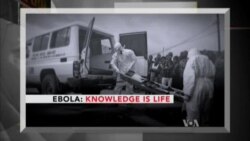Ending the current scourge of Ebola in West Africa will require a more rapid response, better regional coordination of resources and better local distribution of skills and supplies so patients can be treated in their own communities.
Limiting future outbreaks will require strengthening infrastructures, especially in the most affected countries: Guinea, Liberia and Sierra Leone.
Those were among the messages several Ebola experts offered Wednesday during a special edition of “Straight Talk Africa,” a weekly live radio, TV and Web simulcast on Voice of America.
"Ebola has given a wake-up call," said Sierra Leone’s ambassador to the United States, H.E. Bockari Stevens, in calling for a stronger health care system.
Host Shaka Ssali led the discussion before two dozen guests at VOA headquarters in Washington, D.C.
Need for speed
A rapid response is critical in treating a patient – and in identifying an outbreak.
Dr. Malonga Miatudila helped identify the first known Ebola outbreak of the disease – in the former Zaire, now the Democratic Republic of the Congo – in 1976. Between then and 2013, 25 outbreaks occurred, none lasting more than three months. Swift action contained those outbreaks and kept the combined death toll to less than 2,000.
This time around, Miatudila said, there was a significant time lapse before the public health community and global partners responded to the crisis.
"When it started in Guinea, we waited. We waited, we waited, we waited. We spent time," he said. "We waited more than 100 days before acknowledging we had a problem."
As of November 14, some 14,413 reported Ebola cases and 5,177 deaths, according to the World Health Organization, which often has said the toll is undercounted.
Miatudila said treatment was speedier in past outbreaks because it was delivered locally, minimizing trips along treacherous roads that become impassable during the rainy season.
"You don’t need ambulances to take patients from Kenema to Freetown" in Sierra Leone, he said. "What we have done in all these areas is to treat people locally."
In this outbreak, people were instructed to call the central government, which might take several days to send teams to retrieve corpses from distant communities.
Stevens, the ambassador from Sierra Leone, said some local leaders there have "initiated bylaws by which they expected everyone in their community to comply,” reducing the disease’s spread.
Ebola still mysterious
Too much about the disease remains unknown, the panelists said.
"I’m supposed to be the one who knows all the procedures to prevent Ebola, and I came down with it myself,” said physician Rick Sacra, who contracted the disease in August while helping run ELWA Hospital, a Christian medical center in Monrovia, Liberia. He was flown to the United States and treated at the Nebraska Medical Center in Omaha.
"I got tested and treated quite early. … I received care at a level that is unfortunately not available in Liberia," said Sacra, who hopes to return there in January but for now remains at home in Massachusetts. "… Our prayer and our effort ... is to bring better care wherever we can."
Another Ebola survivor, video journalist Ashoka Mukpo, lamented the inequities in care from which he benefited.
Mukpo had been working in Liberia as a freelance cameraman for NBC News and other outlets when he fell ill in October. He was flown to the United States for treatment at the Nebraska Medical Center and since has returned to his home in Rhode Island.
"It just weighed on our hearts to see … all the privilege and infrastructure we have in the West to take care of us,” he said.
More medical personnel needed
Both physicians – Miatudila and Sacra – emphasized the need for more trained medical staff.
Nigeria was able to quickly contain the outbreak because it has a robust health care system, Sacra said, noting the country had "10,000 family physicians in training" when he once visited. In contrast, "you have a nation like Liberia with [fewer] than 100 doctors doing clinical work."
"We have more doctors here in the United States than we do in Sierra Leone," said Stevens, the ambassador.
Appeals for help have brought medical staff to the three beleaguered countries from Nigeria and elsewhere in Africa, as well as from Cuba, China, the United States, Britain, France and elsewhere.
The United States also has made a $1.3 billion commitment to fighting the disease in West Africa, where it has deployed government aid workers and epidemiologists and sent at least 2,000 troops to build treatment units and labs. The Obama administration earlier this month asked Congress for almost $6.2 billion in emergency funding to bolster the government’s response to Ebola at home and abroad.
Foreign aid requests
Foreign assistance has been vital in helping West Africa cope, said Stevens, the ambassador. "The response from the international community has been phenomenal."
But he and others said they wished the aid could be better organized.
“All the good will we appreciate,” Stevens said, “but we want to synchronize with our government. …”
“You have three countries but one region,” Miatudila added. “We would like to have someone who’s going to coordinate West Africa.”
Stevens urged the international community to continue its support, which he said West Africa needs and appreciates.
Orphaned as a boy and raised by an uncle, Stevens said he’s especially concerned about children similarly set adrift by Ebola. "This touches me very personally," he said, “so I’m going to commit some of my [own] money to helping that process.”
The announcement brought applause from the audience.
As soon as the crisis is under control, the focus must be on rebuilding and improving infrastructure – of roads, telecommunications and especially health care, Stevens said.
“I use this opportunity to appeal to African industrialists … to come and help us, especially in the post-Ebola environment. I appeal to the United States. … We appeal in the name of humanity – of those small, young kids to start making provisions for them.”
VOA’s Jessica Berman contributed to this report.
Watch the special edition of "Straight Talk Africa, Ebola: Knowledge Is Life"







